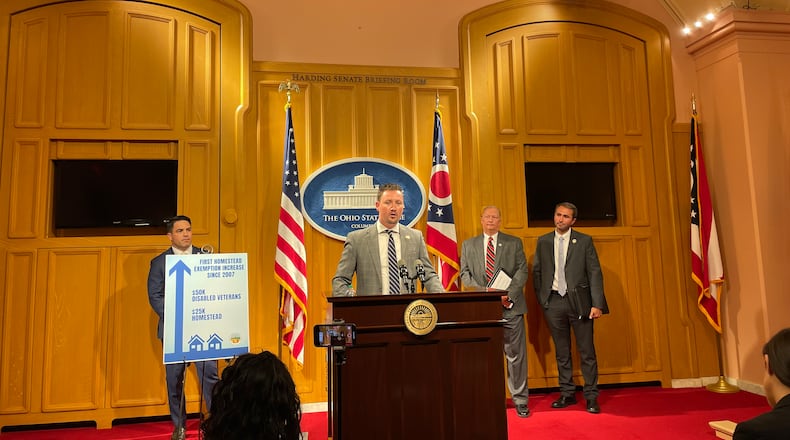Currently, the state’s program saves qualifying homeowners hundreds of dollars a year by shaving off $25,000 of taxable property value through the Traditional Homestead exemption and $50,000 through the Veteran Homestead exemption. Those totals will now increase yearly based on the rise of inflation in Ohio, calculated based on the state’s GDP.
It’s the first time Ohio’s Homestead Exemption has been increased since 2007. According to the Bureau of Labor Statistics inflation calculator, $25,000 in July 2007 has the same purchasing power as $36,689 in July 2023.
Qualifying homeowners must have an income below $36,100 and either be at least 65 years old, or totally and permanently disabled, or the surviving spouse of someone who received the exemption at the time of death. All honorably discharged veterans of the U.S. Armed Forces who are disabled from their service are also eligible, regardless of income, according to the Butler County Auditor website.
The state of Ohio reimburses local governments for revenue lost through Homestead Exemption tax reductions. This change is projected to increase the cost to the state by $11 million in 2024 and $28 million in 2025.
Behind the change was Butler County Rep. Thomas Hall, R-Madison Twp., who told the Dayton Daily News that tying the Homestead Exemption to inflation was the first of many property tax reforms the sophomore representative would like to see both in the Homestead Exemption and other property tax laws.
“For me, it’s still not enough,” Hall said. “I think that we have a lot more steps to take to help people in this state with regards to property taxes. I think this was a good step because this shows that we’re ready to look at reforming the homestead exemption.”
Montgomery County Auditor Karl Keith characterized this adjustment and future reforms to the Homestead Exemption as necessary course corrections by state lawmakers.
“In my opinion, since 2007, there have been a number of things the legislature has done to reduce the state income tax and they’ve made a number of moves that have pushed more and more of the state’s tax burden onto property owners, and that’s kind of been a philosophy they’ve had,” Keith said. “Things like this that help property owners (have) kind of been overlooked and not something that they’ve focused a lot of attention on.”
Keith noted that a handful of Ohio counties including Montgomery, Greene and Butler are in the middle of triennial property valuation updates. Due to soaring housing costs over the past few years, taxable values are expected to rise significantly and bring property taxes higher.
Keith said Montgomery County has about 35,500 homeowners on the Homestead Exemption who save an average of $650 a year, costing the state about $23 million a year for just Montgomery County. The county has an estimated 165,000 homeowners total.
“I think the legislature has an appetite to make some change and I think they have an appetite to respond to those seniors and those who are on fixed incomes, which is what the Homestead Exemption is focused on, and those are the ones who are really struggling to make ends meet and deal with the cost of everyday life,” Keith said. “I’m hopeful that we got their attention and I’m hopeful that we can make some serious changes going forward.”
Another statehouse advocate of the change was northwest Ohio Rep. Steve Demetriou, R-Bainbridge Twp., who laid out his ultimate goal with property tax reform on Wednesday.
“We’re here today to continue the conversation around tax reform generally, but also to ensure that owning and living in a home in Ohio is an achievable dream for everyone, for every Ohioan, especially our seniors and disabled veterans,” Demetriou said, citing recent inflationary increases to the cost of living. “...Representative Hall and I introduced this legislation to ensure these important constituencies don’t get priced out of their homes for reasons outside of their control.”
The two representatives said they’re looking to move Ohio in the direction of states like Florida and Texas when it comes to property taxes, where more homeowners can qualify and the taxable exemptions are higher. Both said they’re not sure which further reforms might come, but indicated optimism about the Ohio General Assembly’s appetite for pursuing changes to Ohio’s property tax laws.
The Homestead Exemption change was originally introduced as House Bill 57 before being rolled into the Ohio operating budget, which itself focused largely on reductions in income and business activity taxes and passed in time for savings to kick in starting next year. Also in the budget was a mandate to create the Joint Committee on Property Tax Review and Reform, which is tasked with completing a report by the end of 2024.
About the Author

